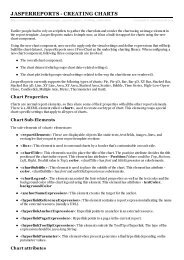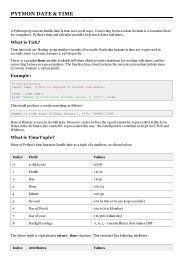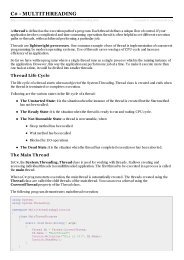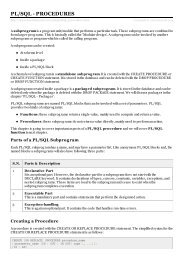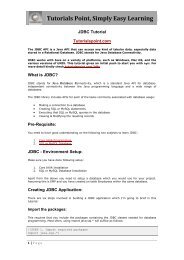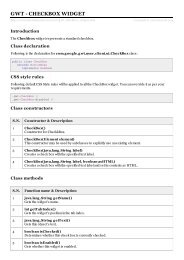Download Scala Tutorial (PDF Version) - Tutorials Point
Download Scala Tutorial (PDF Version) - Tutorials Point
Download Scala Tutorial (PDF Version) - Tutorials Point
You also want an ePaper? Increase the reach of your titles
YUMPU automatically turns print PDFs into web optimized ePapers that Google loves.
38<br />
39<br />
40<br />
41<br />
42<br />
43<br />
44<br />
45<br />
46<br />
47<br />
48<br />
49<br />
50<br />
def size: Int<br />
Returns the number of elements in this traversable or iterator.<br />
def slice(from: Int, until: Int): Iterator[A]<br />
Creates an iterator returning an interval of the values produced by this iterator.<br />
def sum: A<br />
Returns the sum of all elements of this traversable or iterator with respect to the + operator in num.<br />
def take(n: Int): Iterator[A]<br />
Returns an iterator producing only of the first n values of this iterator, or else the whole iterator, if it produces<br />
fewer than n values.<br />
def toArray: Array[A]<br />
Returns an array containing all elements of this traversable or iterator.<br />
def toBuffer: Buffer[B]<br />
Returns a buffer containing all elements of this traversable or iterator.<br />
def toIterable: Iterable[A]<br />
Returns an Iterable containing all elements of this traversable or iterator. This will not terminate for infinite<br />
iterators.<br />
def toIterator: Iterator[A]<br />
Returns an Iterator containing all elements of this traversable or iterator. This will not terminate for infinite<br />
iterators.<br />
def toList: List[A]<br />
Returns a list containing all elements of this traversable or iterator.<br />
def toMap[T, U]: Map[T, U]<br />
Returns a map containing all elements of this traversable or iterator.<br />
def toSeq: Seq[A]<br />
Returns a sequence containing all elements of this traversable or iterator.<br />
def toString(): String<br />
Converts this iterator to a string.<br />
def zip[B](that: Iterator[B]): Iterator[(A, B)<br />
Returns a new iterator containing pairs consisting of corresponding elements of this iterator and that. The<br />
number of elements returned by the new iterator is the minimum of the number of elements returned by this<br />
iterator and that.<br />
Example:<br />
Following code snippet is a simple example to define all the above type of collections:<br />
// Define List of integers.<br />
val x = List(1,2,3,4)<br />
// Define a set.<br />
var x = Set(1,3,5,7)<br />
// Define a map.<br />
val x = Map("one" -> 1, "two" -> 2, "three" -> 3)<br />
// Create a tuple of two elements.<br />
val x = (10, "<strong>Scala</strong>")<br />
TUTORIALS POINT<br />
Simply Easy Learning



